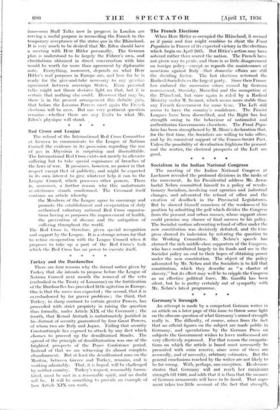Socialism in the Indian National Congress The meeting of the
Indian National Congress at Lucknow revealed the profound divisions in the ranks of the movement. In his Presidential address Mr. Jawa- harlal Nehru committed himself to a policy of revolu- tionary Socialism, involving vast agrarian and industrial changes, and advocated the refusal of office and the creation of deadlock in the Provincial Legislatures. But he showed himself conscious of the weakness of his position by admitting the gulf whichditides the Congress from the peasant and urban masses, whose support alone could promise any chance of final success to his policy. The Socialist motion advocating refusal of office under the new constitution was decisively defeated, and the Con-' gress showed its indecision by referring the qUeSticift • to the Working Committee: Mr. Nehru's speech alarmed the rich middle-class supporters of the Congress, who have contributed largely to its funds • and see in the Socialist policy an end to their hopes of obtaining .power under the new constitution. The object of the policy advocated by Mr. Nehru and the Socialists is to kilt that constitution, which they describe as " a • charter of slavery," but its effect may well" be to cripple the Congress as an effective political force. Mr. Gandhi has been silent, but he is pretty certainly out of sympathy with Mr. Nehru's latest programme.
* * *












































 Previous page
Previous page